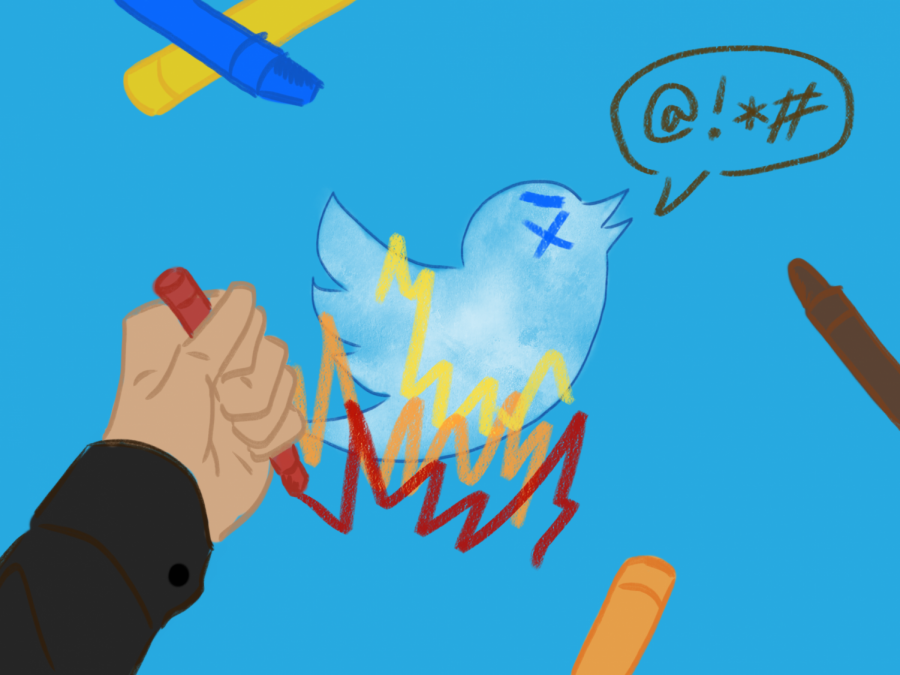Tweeting up a storm
March 1, 2018
Britain First, an alt right organization who is openly anti-Muslim in their policies, recently got retweeted by President Donald Trump. Notorious for invading Muslim shops, mosques, and marching through Muslim neighborhoods, Britain First has painted a portrait of itself that could best be described as Islamophobic. Trump’s supportive retweet of this hate group could lead to his followers and millions of Americans believing false information. This notion could solidify the fear individuals previously had towards Islam and its followers, creating a widespread belief that an entire group of people are inherently prone to violence, further damaging American Muslims’ abilities to be seen as anything other than a threat in our society.
An article posted by The Guardian details a Britain First supporters nationalistic journey towards a “better” Britain.
“A Britain First supporter gave a Nazi salute and shouted ‘white power’ before driving at a curry house owner during a drunken rampage, [a court has heard… He was heard to say:] ‘I’m going to kill a Muslim. I’m doing it for Britain. This is how I’m going to help the country. You people cannot do anything.’”
However, a pressing issue for American Muslims, including myself, is President Trump’s endorsement for this group. His previous anti-Muslim comments transformed into policies such as travel bans and it has quickly become clear to Muslim Americans what opinion the President holds of people like me.
Trump’s retweet of videos posted by Jayda Fransen, founder and political advocate of Britain First, depicted three cases of Muslims being violent towards non-Muslims. The videos were also widely taken out of context, helping reinforce the suspicion that some people hold of Trump being islamophobic. Especially since the tweets were headlined incorrectly, as one man, a Dutchman, was named a Muslim migrant by Britain First, even though he was neither.
Popularization of propaganda like this, considering the sensitive time period we live in today, is destructive to the confidence that adolescent Muslims are developing as they are trying, like all teenagers, to integrate into society as informed young adults.
The president’s Islamophobic retweets prove to be a worldwide catastrophe as he provoked a response from the UN’s human rights chief. A CNN article discusses Zeid Ra’ad Al Hussein’s speech at the UN Foundation.
“The United Nations’ top human rights official was ‘aghast’ over President Donald Trump’s decision to re-tweet anti-Muslim videos from the far-right ultra nationalist group Britain First last week,” states the article. “…offering a robust rebuke of nationalist and populist leaders”
Negative consequences of Trump’s consistent utilization of Twitter, the Presidents’ preferred method of communication with the public, could cause global issues to escalate, best exemplified by increased popularity and media coverage for Britain First due to President Trump’s retweet to his 44.2 million followers. One of the organization’s latest tweets acknowledges the part he played in growing their ranks and increasing their prominence as a political force, and they continue to preach their anti-Muslim platform.
Overall, it has become a necessity to have a more effective and less controversial system with which the commander in chief can address the American people. Trump’s often distasteful comments give birth to a recent and prevalent question: how did presidents connect with audiences and Americans before?
From George Washington’s Farewell Address to Abraham Lincoln’s Gettysburg Address, they lacked a valuable ingredient which underwent mass popularization in past years: mass communication. Calvin Coolidge set a precedent for utilizing new methods of addressing the public as he went on the radio, followed by Franklin D. Roosevelt in his fireside chats, and later presidents continued the tradition.
As advancements in technology improved, adaptation to new methods continued when Harry S. Truman broadcasted a televised statement for the public and George W. Bush maintained podcasts. With the internet becoming a normality, Barack Obama employed the web to post clips in which he informed Americans about various topics. Although he did have an account set up for Twitter, it was mainly used by his staff during the presidential elections. Early in his first term, the former president admitted to not being acquainted with Twitter at all.
The latest commander in chief has sent out over 2,600 tweets since his Election Day, just over a year ago. Trump being a powerful global force and fostering deceitful and false information could further damage the already negative perceptions that some Americans have of Muslims. We, as a country, have become desensitized to President Trump’s turbulent tweets and it is important that we do not settle and accept the detriments, rather speak out for what we believe in even if it may go against the leader of the United States.




